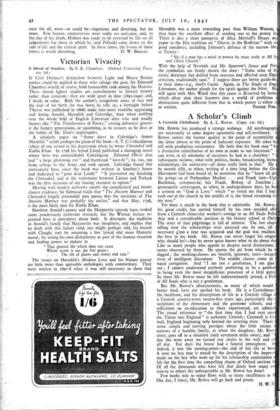Victorian Vivacity
IF Civil Defence's distinction between Light and Heavy Rescue parties could be applied to those who salvage the past, Sir Edmund Chambers would, of course, hold honourable rank among the Heavies. These eleven lighter studies are contributions to literary history rather than criticism ; they are wide apart in date (1893-1940)-and, I think, in value. Both the author's scrupulous sense of fact and the year of his birth (he was born, he tells us, a fortnight before Thyrsis was published in 1866) make him more readable appraising and dating Arnold, Meredith and Coleridge, than when ambling over the whole field of English Literature after trite and woolly themes like " The Timelessness of Poetry," casting defensive glances at the hungry generations, or squirming, as he assures us he does at the habits of Mr. Eliot's nightingales.
A scholarly paper on " Some dates in Coleridge's Annus Mirabilis " yields perhaps the plum of the book—S. T. C.'s elucidation (ritro) of one strand in his depression when he wrote Christabel and Kubla Khan. In 1798 his friend Lloyd published a damaging novel whose hero was unmistakably Coleridgean. Edmund Oliver also had " a large glistening eye " and frustrated " love-fit"; he, too, ran from college to the Army and took opium. Coleridge found this particularly base, since the book was written in Southey's house and dedicated to " poor dear Lamb." " It prevented my finishing the Christabel, and at the retirement between Linton and Porlock was the first occasion of my having recourse to opium."
Moving with modest authority amidst the complicated and incon- clusive evidence, Sir Edmund holds that " The Ancient Mariner and Christabel largely proceeded pari passu; that the initiation of The Ancient Mariner was probably the earlier," and that May, 1798, is the most likely date for Kubla Khan.
Matthew Arnold's poetry and the Marguerite episode have evoked some ponderously irrelevant research, but the Warton lecture re-
printed here is perceptive about both. It discounts the tradition in Arnold's family that Marguerite was imaginary, and implies that he dealt with this failure (and, one might perhaps add, his breach with Clough, too) by assuming a less lyrical and more Homeric mood ; by seeing his own disharmony as part of the human situation and finding power to endure in " That general life which does not cease Whose secret is not joy but peace ; . . . The life of plants and stones and rain."
The essays on Meredith's Modern Love and his Nature poetry are little more than agreeable anthologies with commentary. They were written in 1897-8 when it was still necessary to show that
Meredith was a more rewarding poet than William Watson, they have the excellent effect of sending one to the poetry it There is also a short panegyric of Alice Meynell's Essays an paper in the Elia tradition on " Ghosts in the Bodleian " with good anecdotes, including Johnson's defence of the narrow lib at Trinity:
" Sir, if a man has a mind to prance he must study at All and Christ Church."
With the help of Newbolt and Mr. Sparrow's Sense and Poe the symbolists are firmly shown the door: " Some echo of exotic doctrines ha( drifted from overseas and affected even Eng criticism, traditionally sane." I suggest there are better guide- to their aims—e.g., Axel's Castle. Again, in The Study of Eng Literature, the author pleads for the spirit against the letter. M will agree with Mrs. Woolf that this cause is ill-served by lec which often shut their listeners into a world of problems abstractions quite different from that in which poetry is either r


























 Previous page
Previous page